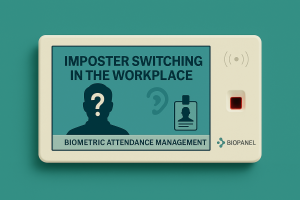In the world of business, the old adage “time is money” holds more truth than ever especially as employment costs have just increased. Every minute wasted or mismanaged equates to financial loss, and one of the most significant yet often overlooked areas where businesses lose money is through poor employee attendance management. If left unchecked, absenteeism, tardiness, and time theft can lead to financial instability, reduced productivity, and even long-term reputational damage.
The Cost of Poor Attendance Management
Many business owners underestimate just how much money they lose due to inefficient attendance tracking. Employees arriving late, leaving early, or frequently calling in sick without valid reasons can accumulate substantial financial losses over time. Studies have shown that companies lose billions annually due to absenteeism, with the financial burden including:
- Lost Productivity: When employees are absent or late, their work often falls on colleagues, leading to a dip in efficiency and morale.
- Increased Overtime Costs: To compensate for absent employees, businesses may have to pay overtime wages, increasing payroll expenses.
- Missed Deadlines and Poor Customer Service: Delayed projects and poor service quality due to understaffing can result in lost clients and revenue.
- Administrative Burdens: HR departments spend valuable time tracking down employees, adjusting schedules, and dealing with the fallout from poor attendance.
The Impact on Productivity Output
Beyond financial losses, poor attendance management has a direct impact on productivity. Employees who are frequently late or absent disrupt workflows and create bottlenecks in operations. This leads to:
- Decreased Team Efficiency: When one employee is absent, others must pick up the slack, often reducing their own efficiency in the process.
- Lower Employee Morale: Consistently covering for absent co-workers can lead to resentment and disengagement among employees.
- Reduced Work Quality: Rushed or overburdened employees are more likely to make mistakes, affecting overall output quality.
- Strained Customer Relationships: Delayed responses and missed deadlines can harm a company’s reputation and lead to client dissatisfaction.
How to Improve Attendance Management
To protect your business from the negative effects of poor attendance, consider implementing the following strategies:
- Utilise an Attendance Tracking System: Investing in an automated system can help monitor attendance patterns and identify problem areas.
- Set Clear Policies: Establish and enforce attendance policies that outline expectations and consequences.
- Encourage Accountability: Hold employees responsible for their attendance while recognizing and rewarding punctuality.
- Offer Flexible Work Arrangements: Consider hybrid or remote work options where feasible to reduce unplanned absences.
- Address Underlying Issues: If absenteeism is a recurring issue, investigate potential causes such as workplace dissatisfaction, health concerns, or burnout.
Conclusion
Time is money, and poor attendance management can cost your business more than just pounds—it can erode productivity, weaken team morale, and damage customer relationships. By implementing proactive attendance management strategies, businesses can protect their financial stability and create a more productive and engaged workforce. Don’t let time slip through your fingers—manage attendance wisely and watch your business thrive.
For information on how Biopanel systems can support you in your time management processes, please get in touch.


